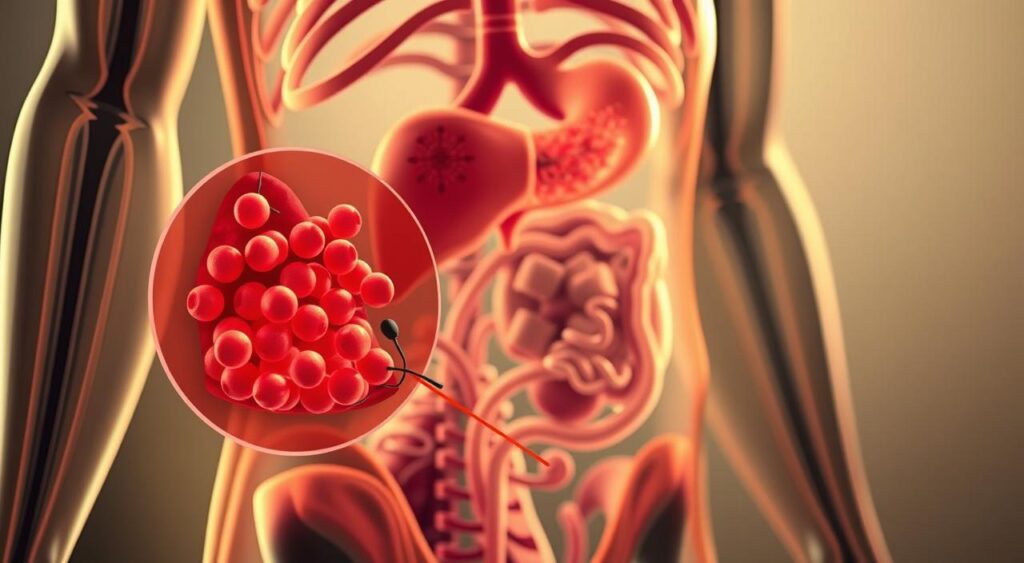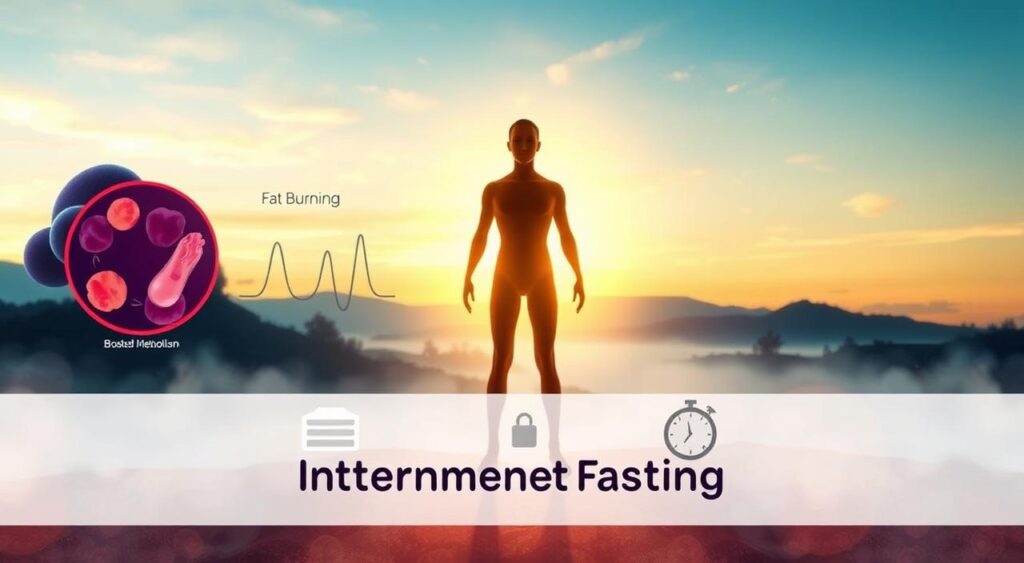Ever thought about how intermittent fasting could make you healthier and slimmer? This eating pattern alternates between fasting and eating. It has many health benefits, like better metabolism and blood sugar control.
Studies show it can also regulate hormones and improve cellular processes. This might even help you live longer and feel better. Learn how intermittent fasting can change your health in this article. It covers heart health, reducing inflammation, and improving insulin sensitivity. Start discovering the health benefits of intermittent fasting today!
What is Intermittent Fasting?
Intermittent fasting is an eating pattern that switches between eating and fasting. It’s not about what you eat, but when. For example, the 16:8 method lets you eat for eight hours and then fast for 16.
The 5:2 diet is another option. You eat normally for five days and then eat very little on two days. This way, you can choose a fasting plan that fits your life.
When you fast, your body changes a lot. It starts using fat for energy better, gets better at handling insulin, and repairs cells. This makes fasting flexible and appealing to many.
People pick fasting plans that match their daily life. This makes it easier to stick with in the long run.
The Science Behind Intermittent Fasting
Intermittent fasting changes your body in amazing ways. When you fast, your body burns more fat because insulin levels go down. At the same time, human growth hormone levels might go up, helping you build muscle and lose fat.
Fasting also starts a process called autophagy. This is when your body gets rid of old or damaged cells. It helps lower oxidative stress. Plus, fasting can turn on genes that help you live longer and fight off diseases.
Intermittent Fasting Benefits: How It Boosts Metabolism
Intermittent fasting has many benefits for your metabolism. It mainly works by changing your hormones. These changes help your body burn fat better and improve your metabolic health.
Hormonal Changes During Fasting
When you fast, your body changes in important ways. For example, insulin levels go down. This lets your body use stored fat for energy more easily.
Also, your body makes more human growth hormone (HGH). This hormone helps you lose fat and keep your muscle mass.
Impact on Insulin Levels
Intermittent fasting also lowers insulin resistance. This can help you lose weight and improve your metabolism. Many people find they have more energy and it’s easier to manage their weight.
How Intermittent Fasting Burns Fat
Intermittent fasting is a popular choice for weight management. It changes how your body uses energy, helping you burn fat. Knowing how it works can help you get the most from fasting.
Increased Fat Oxidation
When you fast, your body changes how it uses energy. It starts to use fat for fuel, which helps burn stored fat. This is great for losing weight.
Caloric Restriction and Weight Loss
Intermittent fasting helps you eat fewer calories without counting them. It makes it easier to eat less. Studies show it leads to weight loss by burning fat and controlling calories. For a fasting meal plan, check out this guide.
| Study | Participants | Duration | Average Weight Loss |
|---|---|---|---|
| Study A | 50 | 8 weeks | 7% |
| Study B | 30 | 12 weeks | 9% |
| Study C | 40 | 16 weeks | 10% |

Intermittent Fasting Benefits for Blood Sugar Balance
Intermittent fasting offers many benefits for blood sugar control. It lets your body reset its metabolic processes, improving insulin sensitivity. You might see better glucose metabolism and lower fasting blood glucose levels.
Research shows that people who fast often have lower glycated hemoglobin (HbA1c) levels. This can lower the risk of type 2 diabetes. Fasting can change how your body handles sugar.
Studies show that fasting improves insulin sensitivity. This means your body can manage glucose more efficiently. It helps with weight management and is good for those at risk of metabolic syndrome.
| Fasting Duration | Insulin Sensitivity Improvement | Blood Sugar Levels Reduction |
|---|---|---|
| 16 hours | Moderate | 5-10% decrease |
| 24 hours | Significant | 10-15% decrease |
| 36 hours | Very Significant | 15-20% decrease |
By trying intermittent fasting, you can improve your insulin sensitivity and balance blood sugar levels. Changing your eating habits can boost your metabolic health and overall well-being.
Additional Health Benefits of Intermittent Fasting
Intermittent fasting does more than help you lose weight and control blood sugar. It also boosts heart health and lowers inflammation. This makes it a great choice for many people. Knowing how fasting helps your heart can show you its full benefits for your health.
Improved Heart Health
Intermittent fasting is good for your heart in many ways. Studies show it can lower blood pressure and improve cholesterol and triglyceride levels. These changes help reduce the risk of heart disease, supporting your heart’s health.
Reduced Inflammation and Oxidative Stress
Intermittent fasting also lowers inflammation, which is key to preventing chronic diseases. This helps you stay healthy and can lead to better aging. It also helps your body fight oxidative stress, adding to your long-term health benefits.

Intermittent Fasting Research and Findings
Research on intermittent fasting has shown many health benefits. Studies have found improvements in body weight, insulin sensitivity, and lipid profiles. This suggests that intermittent fasting can help manage weight and protect against diseases like diabetes and heart disease.
Scientists are now looking into the long-term effects of intermittent fasting. They are studying different fasting methods to understand their impact on longevity and disease prevention. These studies help us understand how intermittent fasting can improve our health.
Types of Intermittent Fasting Methods
Intermittent fasting comes in many forms to suit various lifestyles. Knowing these methods can help you pick the best one for your goals. Here are some common fasting schedules to consider:
- Time-Restricted Eating: This method means eating all meals in a set time each day. Many choose an 8-hour window, fasting for 16 hours.
- Alternate-Day Fasting: You alternate between fasting days and regular eating days. You can eat very little or nothing at all on fasting days.
- 5:2 Diet: You eat normally for five days and limit calories to 500-600 on the other two days.
- ADF (Every Other Day Fasting): Similar to alternate-day fasting, you fast one day and eat normally the next.
These methods are flexible, making intermittent fasting a good choice for many. By picking a fasting schedule that fits your life, you can increase your chances of success.

| Fasting Method | Eating Window | Fasting Duration |
|---|---|---|
| Time-Restricted Eating | 8 hours | 16 hours |
| Alternate-Day Fasting | Varies | 24 hours |
| 5:2 Diet | Normal for 5 days | 2 non-consecutive days (500-600 calories) |
| ADF (Every Other Day Fasting) | Normal | 24 hours |
Safety and Considerations of Intermittent Fasting
Intermittent fasting can be good for your health, but it’s important to think about the safety of intermittent fasting. This is true, even more so for people with health issues. Before starting, there are a few things to keep in mind.
If you have diabetes or heart problems, talk to your doctor first. Some medicines can mess with fasting. A doctor can help you stay healthy while trying fasting.
Starting a fasting plan can cause side effects like headaches or feeling tired. These feelings are normal, mostly when you’re just starting. Knowing about these symptoms can help you adjust and make better choices for your health.
Think about your own situation when considering intermittent fasting. Your age, lifestyle, and health can affect how it works for you. Take time to learn about the considerations for fasting that apply to you.
| Consideration | Description |
|---|---|
| Diabetes Management | Consult healthcare professionals to avoid complications related to blood sugar levels. |
| Heart Health | Monitor any pre-existing heart conditions with a healthcare provider. |
| Medication Interactions | Discuss any medications affecting metabolic functions before fasting. |
| Initial Side Effects | Watch for symptoms like headaches and fatigue during the adaptation phase. |
How to Get Started with Intermittent Fasting
Starting intermittent fasting can seem daunting at first. But, it doesn’t have to be. Begin with the 16:8 method. This means you eat for 8 hours and fast for 16.
This gradual approach lets your body adjust slowly. It avoids sudden changes.
Keeping a food journal is a great way to track your eating. It helps you stay on track and meet your nutritional needs. Focus on eating whole foods like fruits, veggies, lean proteins, and healthy fats during your eating times.
Drinking plenty of water is key during fasting. It keeps you energized and helps reduce hunger. Getting advice from dietitians or nutritionists can also help. They offer personalized guidance to support your fasting journey.

Intermittent Fasting: Possible Drawbacks
Intermittent fasting has many health benefits. But, it’s important to know its possible downsides. You might feel hungrier, more tired, and irritable at first. These feelings can make it hard to stick to the fasting plan.
Also, not eating enough during your eating times can lead to nutrient deficiencies. This can harm your health over time. Fasting might also mess up your daily routine, making it hard to fit into your life. Knowing these challenges helps you prepare and find ways to overcome them.
Conclusion
Intermittent fasting is a smart way to boost your health and happiness. It helps improve your metabolism, burn fat, and control blood sugar. These benefits make it a top choice for those wanting a healthier life.
Fasting might seem hard at first, but there are many ways to do it. You can pick the method that fits you best. This makes fasting a doable and lasting choice for better health. Trying intermittent fasting can change your life for the better.
To learn more about fasting’s benefits, check out this source. Starting intermittent fasting could be the first step to a healthier, more balanced life.




Pingback: Intermittent Fasting Benefits: How It Boosts Metabolism, Burns Fat, and Balances Blood Sugar
Pingback: Intermittent Fasting for Beginners: How It Works, Schedules, and What to Expect
Pingback: 16/8 Intermittent Fasting: Beginner’s Guide + Sample Day